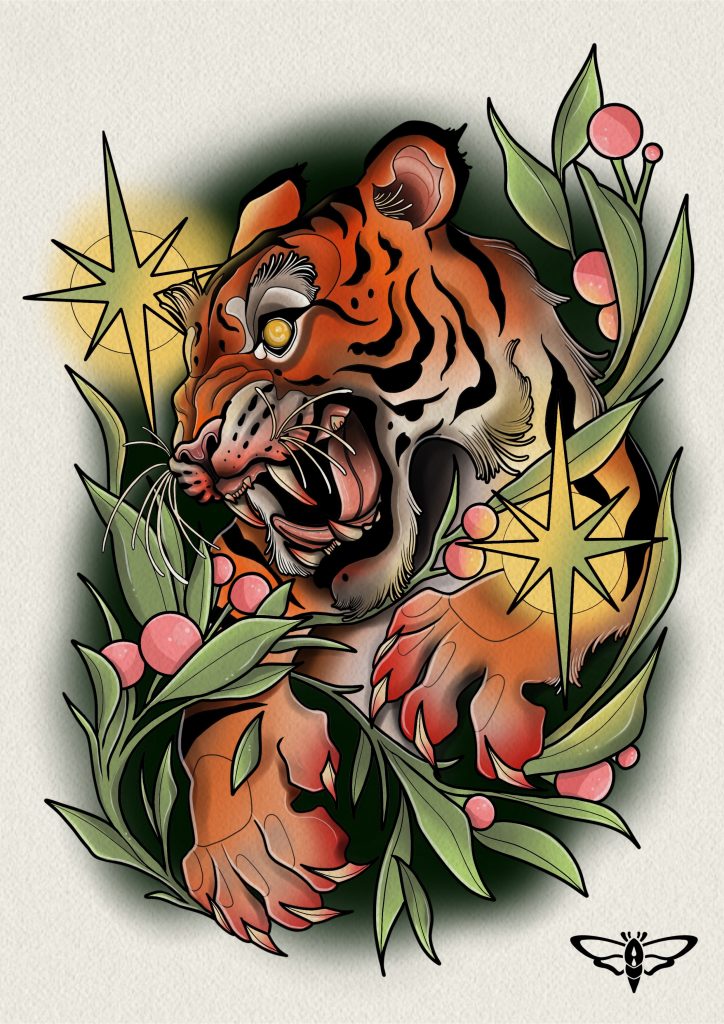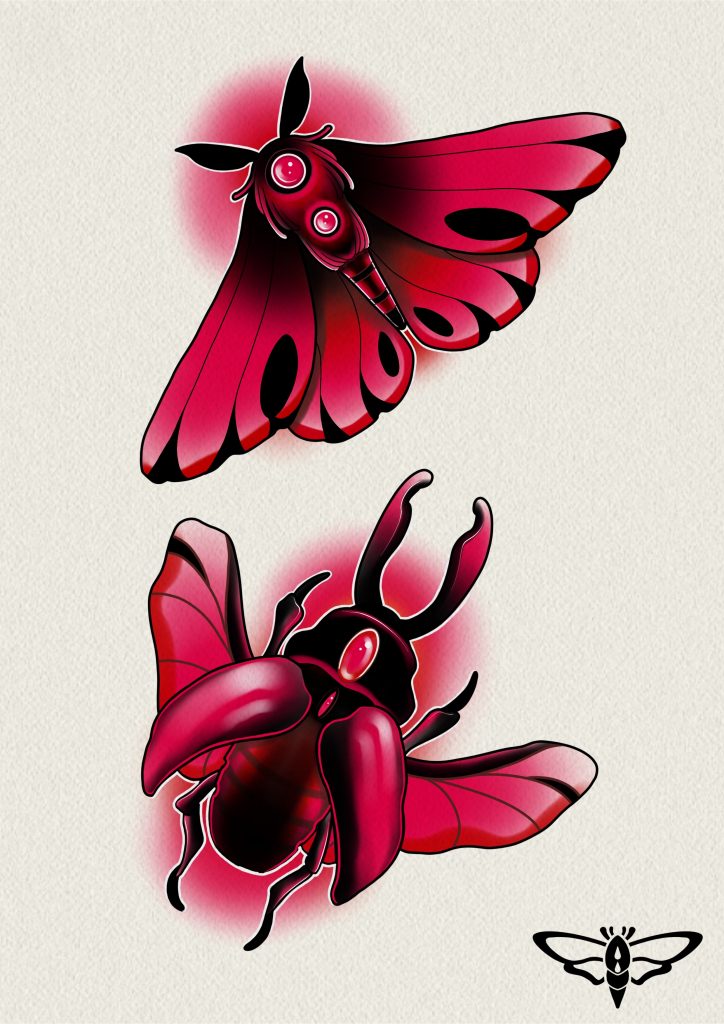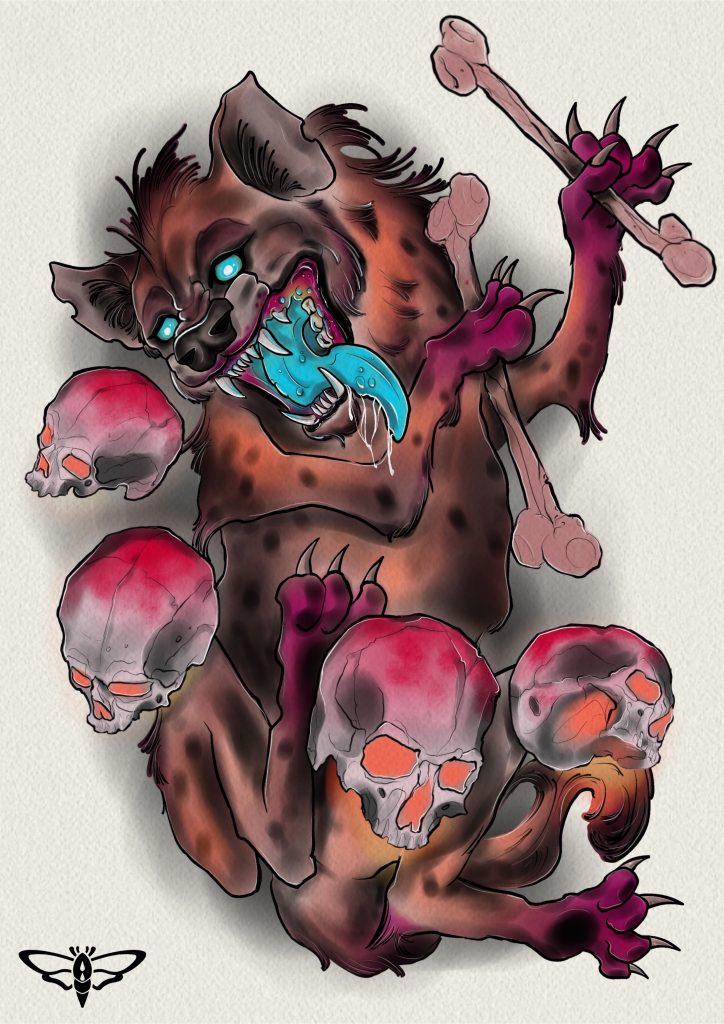Bonnie Maxwell, self proclaimed ‘Autistic Queen’ is a tattoo apprentice at Gun and Pedal Tattoo Studio in Brighton. Since sharing her experiences as a person with autism in the tattoo industry on Instagram, we knew we had to speak to Bonnie and find out more about her story…

What made you want to become a tattoo artist? I sort of just fell into it, I always knew I was going to do something creative with my life as drawing is everything to me. I have a first class degree in Illustration from Brighton University so from there I’ve had multiple creative jobs, but never felt I could really be myself in them, tattooing felt natural to me and the thought of being my own boss as a queer autistic woman felt empowering.
What do you love to tattoo or draw, what inspires you? To put it simply, I am a neo-traditional artist who loves colour, animals and nature and anything in between. A lot of my inspiration comes from concept sketches and video games and even from my love of Pokémon, just a huge mix of drawing Pokemon for years and translating that into something I enjoy. I like using colour and subject themes and sometimes limiting my colour palette and drawing in a way that fits the space and canvas perfectly.
When did you get your autism diagnosis? Can you tell us about this? Absolutely, so I have always known there was something different about me – even when I was younger, I never really had an interest in having loads of friends or doing all the “normal” things a teenager would. I was more interested in my hobbies and my art.
I was officially diagnosed in November 2019 at the age of 27. Up until this point I really struggled socially and didn’t have a clue that I might be autistic, just because the general portrayal of people with autism is very different, and what most don’t realise is that it’s a spectrum and women can present differently to men. Women have the ability to mask, to blend in, which means obtaining a diagnosis can be such a challenge as women can appear to seem “normal”. I was lucky enough, but there are still so many out there who need that support.
Can you tell us about your experiences within the tattoo industry? Have you struggled with apprenticeships before? Where do I start? So I’ve basically struggled with every apprenticeship I’ve been in, I’m in my fifth now and I’m totally okay with that. My current studio have been super supportive and just let me tattoo and get on with it and that’s all I ask for. I’ve been in a few different kinds of apprenticeships, each with different ways of doing things and I have picked up tips from each, but never managed to really stay at a studio so predominantly I am self-taught.
I feel like there isn’t an understanding of disabilities, even in this industry. I have experienced bullying first hand which is never okay and those artists should feel ashamed.
I have tried to fit in with studio banter, I’ve been called lazy which is insulting as there’s not a day that goes by where I’m not drawing. I’ve had people tell me to fake it ’til I make it, pretend to be confident, to look busy and talk to the customers all the time, even though all I wanted to do was avoid the drama and draw. I didn’t want to lose another apprenticeship because I didn’t do what my mentor asked, but because of my disability, I didn’t feel like I could change myself to fit a mould and this became overwhelming so most of the time I ended up leaving.
Because of my autism I don’t really have a filter and most of the time I will just say it as it is, which can get me into trouble and I don’t always understand that this could be wrong. Because I have poor organisational skills, I mostly forget what I’ve been told to do and this can make it seem like I’m lazy. I have strong beliefs in right and wrong and will correct someone without realising, I also have a lot of sensitivities – like if people are talking over each other and music is too loud, it’s physically painful. For eight hours a day, I avoid eye contact and social interaction which can be exhausting. These are all things I’ve come across in a studio setting. This is just my experience and how I’ve felt, but may be completely different in a more understanding studio or for someone else with a disability.

What do you find most challenging about tattooing? Tattooing itself feels like the most natural career for me, it’s the personalities and egos that make it challenging especially in those that have very specific views on what an apprenticeship should be. Social engagement is hard enough when you have autism, so having to deal with other people makes the job harder. I feel like some still believe an apprenticeship should be a challenge and something gruelling that you have to earn, which may have been how they did it back in the day, but now anyone can tattoo. Just because your mentor was treated badly and had a hard time in their apprenticeship doesn’t mean you should be treated the same.
There’s also no job security, so as an apprentice you are completely dispensable. As someone with autism or a disability, you will have your own way of learning and adapting a task to make it more manageable. When I was trying to do a traditional apprenticeship and be someone’s cleaner for a year, I didn’t feel like I was progressing much. Although I did learn about cleanliness and health and safety, I learned this from artists outside of my apprenticeships and made my own cleaning routine.
I know I may upset some by saying this but I believe if someone has the artistic talent and promise to do well they should be able to learn in a way that encourages this and is accommodating with their disabilities. Tattooing should be accessible to all.
In what ways do you think your autism helps you and makes you a better tattooer? Ooh now how to start this without coming across as arrogant or blunt. My brain is wired differently so I have a completely different view of the world. It may be different to others with the same disability, but for me I can see and view things in a very unique way. People with autism tend to have special interests which means we have intense interest in certain subjects or hobbies. Some like bikes or watches I have an intense interest in art and tattooing, not to mention my not-so-secret love for Pokemon. That love will never die.
So for me instead of going out and socialising or drinking or doing anything else, I spend 90 per cent of my time doing something tattoo related, whether it’s researching needle groupings, or learning techniques, or finding out about the different types of aftercare or working on how I can give my client a great experience and tattoo. I have the ability to hyper-focus and draw for hours and hours without taking a break, I’m fast and can knock out three or four full colour flash sheets if I wanted in a single day.
Nobody can tell me I’m not passionate or cut out for this industry because I can’t complete a traditional apprenticeship, when I live and breathe art and tattooing every day. My clients love this about me and how much time and effort I put into my work for them.
Tattooing is not just a job or a rockstar lifestyle, it’s a passion. I am proud I’m autistic because I feel lucky to feel so passionate about what I do and this is what makes me feel like I make a better tattoo artist.

What would you like your clients to know about you or is there anything they can do during the appointment or before that could help? So everyone with autism is different and will have different requirements and needs. For me, too much social interaction can feel exhausting so unless I know the client very well sometimes I don’t talk as much and just get on with the tattoo. That’s never a sign that I’m being rude, I would rather focus on getting the tattoo perfect for the client than to have to think of phrases and conversations. I have sensory issues so if I’m not feeling myself that day I may stick a headphone in so I don’t get overwhelmed. Again I don’t mean to be rude, it just helps me to give you the best tattoo I can.
Also change is a big scary thing for someone with autism, for me I could have a bit of a flap if a client changes their mind too much on the day of the tattoo, because with my disability I can’t process that change if I have planned out the tattoo. This seems like an explosion of information for the client but honestly it’s not that bad, all my clients have been awesome and understanding and are completely clear and let me do my thing. So far anyways…
What advice would you give studio owners or other tattooists who either have autism themselves or work with someone who is? Best advice to anyone in my shoes is to be honest and upfront with your mentor about your needs and discuss how you like to learn and what you both can do for each other to make sure no communication is lost. Never tolerate an apprenticeship that treats you badly or makes you do things that are completely not tattoo related or puts you in a position where you have to fit their mould. You are better than that.
There will always be people that will bully and drag you down especially when you are talented and different, but never let it get to you. The journey doesn’t matter, we all want to be in the same place. And to the mentors out there with an autistic apprentice or looking to take one on, my biggest advice for you would be to learn all you can about autism, learn about your apprentice’s needs and how they like to learn. Even for an autistic client this would be useful, ask if they would like the music turned down or an extra pillow for sensory issues. To be inclusive and knowledgeable will really have a positive impact on this industry.